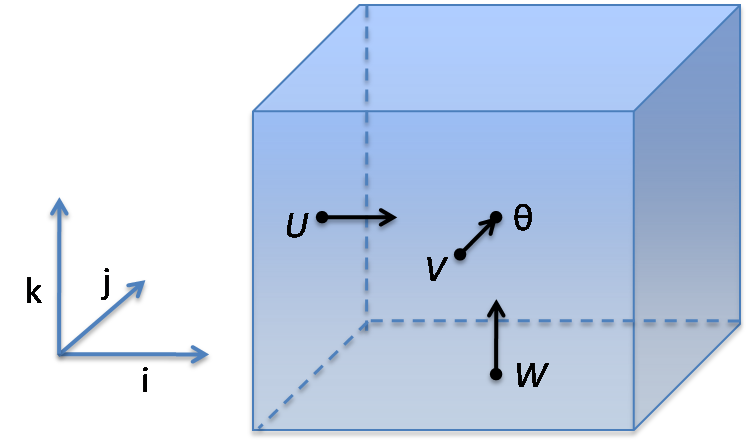Difference between revisions of "How to interpret WRF variables"
(→Grid) |
(→Grid) |
||
| Line 8: | Line 8: | ||
* at the center of the front face - V point, staggered in Y | * at the center of the front face - V point, staggered in Y | ||
* at the center of the bottom face - W point, staggered in Z | * at the center of the bottom face - W point, staggered in Z | ||
| − | Scalar variables (such thermodynamical variables, hence the theta: temperature, pressure,...) generally live at theta-points. One exception is the geopotential, which lives at W-points. Components of the wind velocity vector U,V,W live at the corresponding points, hence | + | Scalar variables (such thermodynamical variables, hence the theta: temperature, pressure,...) generally live at theta-points. One exception is the geopotential, which lives at W-points. Components of the wind velocity vector '''U''', '''V''', '''W''' live at the corresponding points, hence the point names. |
==Elevation== | ==Elevation== | ||
Revision as of 21:55, 7 August 2010
Grid
Grids in WRF are logically rectilinear. Variables for WRF cell indexed (i,j,k) can be located at one of 4 possible point. You can tell where by looking at the WRF registry or the attributes of NetCDF files, which WRF uses as I/O format. You can also tell by the fact that staggered variables have the staggered dimension larger by one, since there needs to be variable at the last boundary face.
- at the center of the cell - theta points, not staggered
- at the center of the left face - U point, staggered in X
- at the center of the front face - V point, staggered in Y
- at the center of the bottom face - W point, staggered in Z
Scalar variables (such thermodynamical variables, hence the theta: temperature, pressure,...) generally live at theta-points. One exception is the geopotential, which lives at W-points. Components of the wind velocity vector U, V, W live at the corresponding points, hence the point names.
Elevation
Temperature
Wind
Fire variables
Footnotes
</references>
See also
- WRF output fields from the WRF-ARW user's guide
- A Description of the Advanced Research WRF Version 3 (June 2008) Fig 7.3 page 59
This page is a stub. You can help by expanding it!
